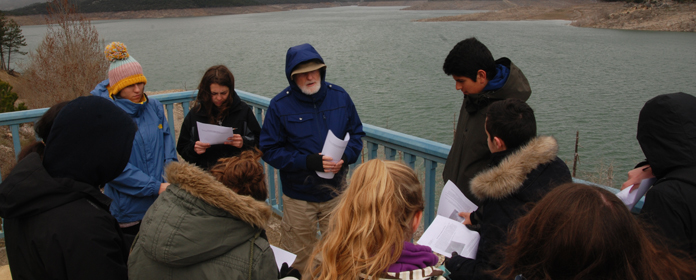Water: resource in danger of extinction
Joe McBride warns that this resource will be critical in regions such as Spain and California.

The students of Degree of Environmental Sciences of the School of Sciences have had, for two weeks, an exceptional teacher, the Full Professor of the University of Berkeley (California) Joe McBride, expert in the management of the resource basic for life: water.
In the subject of Hydrology, Professor McBride has shown "in situ" to the students how to carry out the necessary analysis and measurements to study the resource of the water in the rivers Erro, Irati and Arga in Navarra. On this occasion, the expert has warned of the need for Navarra and Spain, like California, to carry out a different management of its water resources, which will be critical in the scenario of climate change that is coming.
In this sense, he adds that California is already taking some measures after the severe drought it has been suffering for four years: "Until now, water was taken from the areas where it was more abundant to the driest areas which, in the case of California and also in many regions of Spain and the Autonomous Community, are the most populated areas and with the greatest weight of agriculture, the activity that implies a greater consumption of water".
At its department for Environment, Science, Policy and management of the American university, they are working on solutions for sustainable water consumption in the most populous state in the USA, with almost 40 million inhabitants: "From switching to crops that require less water, to the use of recycled water in gardens and public areas - where only treated water can be used - and also in homes - in California 25% of domestic water is already recycled - to preventing the overexploitation of aquifers, which is another major problem in dry areas such as ours".
Sao Paolo, or how to survive on 2 hours of water a dayIn the case of irrigation methods, which are fundamental for their agriculture, there is ample room for improvement: "We know that around 40% of the water evaporates in open-air surface canals and there are much more efficient methods, such as drip irrigation, which is already widespread in countries such as Israel".
For the expert, who also teaches class at the Master's Degree in Biodiversity, Landscapes and Sustainable management of the academic center, only if these regions anticipate the increasingly frequent lack of water will it be possible to avoid such drastic measures as those taken in some Brazilian cities, afflicted by severe droughts in recent years. "In Sao Paulo they have had to impose restrictions limiting water use to two or three hours a day. The reality is that our habits must change," warns the expert.
